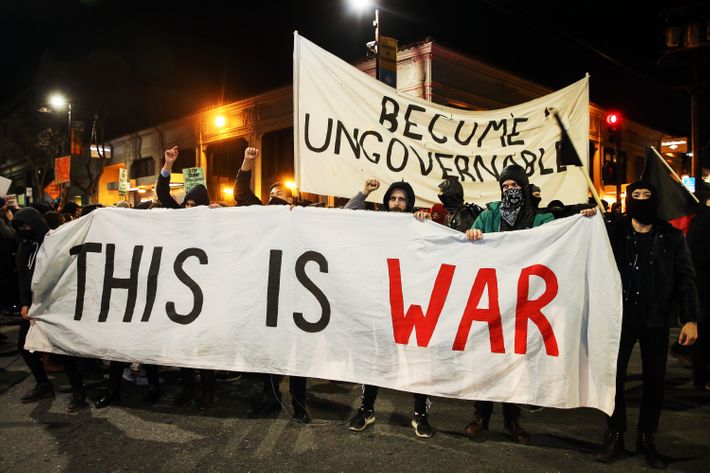
A lot of people fail to recognize this, but Milo Yiannopoulos, the Breitbart senior editor and right-wing provocateur, is much closer to being Sean Hannity than to being Adolf Hitler. It’s a bit of a secret, in part because Yiannopoulos devotes a great deal of time and effort to a form of ideological dress-up, pretending to be more edgy and out-there than he actually is. His college tour is called the “Dangerous Faggot” and his upcoming book is called Dangerous because Yiannopoulos wants to position himself as an incendiary liberal bête noire. He profits off of it — it’s his brand.
That’s why what happened at Berkeley last night was such a boon to Yiannopoulos. Over the course of a chaotic evening, anti-Yiannopoulos protests grew so heated — a fire, clashes with police, a shelter-in-place order — that the talk was canceled, and he was evacuated by police. In short, it was a marketer’s fantasy and is sure to sell more tickets and books for Yiannopoulos, and to provide him and his allies with more fodder for their “Liberals hate free speech!” screeds — “The Left is absolutely terrified of free speech and will do literally anything to shut it down,” said Yiannopoulos on Facebook.
The riots even showed up in a Donald Trump tweet this morning:
This isn’t the first time a Yiannopoulos appearance has caused violence and turmoil on a college campus; in fact, it has happened a lot recently. In addition to a number of rowdy protests, some of which forced cancellations of Yiannopoulos’s planned appearances, during a particularly chaotic recent protest of a planned Yiannopoulos appearance at the University of Washington, a Yiannopoulos supporter actually shot a protester (he’s going to be okay).
What’s going on here is something of a self-fulfilling prophecy. Yiannopoulos preened and joked and harassed his way into public-enemy-number-one status among some left-leaning folks despite the fact that his actual beliefs are, by the standards of mainstream reactionary conservatism, fairly boring and predictable. Just look around at his Breitbart author page: If you ignore the overheated headlines and constant references to his own greatness, it’s clear that Yiannopoulos is, for the most part, serving up microwaved portions of mass-market right-wing goonery.
Same goes for his college speeches. The transcript of one is headlined “MILO at Cal Poly State University: ‘No More Dead Babies.’” “Can you imagine, and I don’t think this is a stretch, the senior leaders of Planned Parenthood sitting in a conference room discussing the best timing for an abortion, to maximize their profits from the dead baby’s body?” he told his Cal Poly audience. “It’s horrifying, and it’s what feminists want more of.” It’s also the same argument you’ve heard on a Fox News segment.

If you are above a certain age and familiar with right-wing discourse in the U.S., much of Yiannopoulos’s work, a sizable portion of which is (or at least was) written by a small army of interns, just isn’t particularly new or interesting. His articles and arguments are usually just iterations of the same right-wing talking points you can hear on Rush Limbaugh or Michael Savage or Sean Hannity or a dozen other right-wing bomb-throwers at any hour of any day: Did you know that there’s a lot of black-on-black crime? Why don’t libtards realize that Muslims want to destroy America? How many babies are Democrats going to kill? That’s not to say these arguments aren’t hateful and harmful to the groups they target, or that these hosts don’t, like Yiannopoulos, say crazy-sounding things to get attention and rile up the left — but the fact is that they are mainstream, and they represent the views of a big chunk of the country.
Yiannopoulos has been able to have it both ways: portraying himself as some unspeakably dangerous exemplar of politically incorrect Truth, the Über-triggerer, all while staying mainstream enough to allow for certain valuable-from-a-marketing-perspective forms of plausible deniability and a fat book deal from Simon & Schuster. In other contexts, and with the exception of media-tracking organizations like Media Matters, progressives have generally realized that there is very little bang for the buck in freaking out over figures like Limbaugh and Hannity, given that these sorts of pundits are an entrenched part of our discourse and are preaching to loyal choirs. Which raises the question: How has someone like Yiannopoulos managed to set a college campus on fire despite bringing so little that’s new to the table?
Yiannopoulos capitalizes on the fact that his youngest fans and detractors (and it’s not an accident his most ardent fans and detractors tend to be young) are typically only familiar and comfortable with a pretty narrow discourse — precisely what one finds on college campuses at the moment. Academic communities tend to be places where the bounds of acceptable expression and thought are significantly different than they are on, for example, right-wing AM radio. Ideas that are unfortunately commonplace in a nation of 350 million people, and especially among older demographics, seem more singular and uniquely dangerous (to use Yiannopoulos’s chosen term) on college campuses — especially when they’re coming from such a flamboyant, gleefully bellicose figure. The fact that Yiannopoulos has a tendency to harass people, both online and off-, only acts to further mask the staleness of his actual beliefs. His Leslie Jones tweets are the most famous examples, but there are plenty of others. During two of his recent talks, for example, he showed pictures of and denigrated members of the communities where he was speaking — one involving a sociology professor, whom he called a “Fat Faggot” onscreen, and the other a trans student — in a way that seems geared at inciting harassment. (Yiannopoulos is himself gay and once wrote an article giving his fans “permission” to call other people “fags.”)
Yiannopoulous’s fans also misconstrue his shtick as new or uniquely edgy, and from their point of view it’s a good thing. Since he first got famous stoking the anti-feminist fires of Gamergate, he has attracted an audience of resentful young people frustrated with “political correctness,” many of whom believe they aren’t “allowed” to say various offensive things. Now, it is plainly false that reactionary speech is severely restricted in the U.S.: Anyone who listens to the aforementioned talk-show hosts knows that there’s a huge market for misogynistic and racially dog-whistling language. This is a common conservative falsehood, that in a country that elected Donald Trump people are getting fired or blacklisted left and right simply for “tellin’ it like it is.” But again, if you’re a young person who hasn’t been exposed to that side of the discourse, and you’re suspicious of the liberal discourse that prevails on many campuses, Yiannopoulous is a shock to the system. He feels new and important, despite the fact that he isn’t.
It’s hard to blame college students for being outraged at this sort of rhetoric, of course. Every day, Yiannopoulos and figures like him really do slander and insult huge swaths of the American public. But they’re also, unfortunately, a fairly entrenched part of our political culture that isn’t going anywhere. In many cases, from a progressive perspective, they’re best ignored except on those occasions when they cross certain lines that, at least arguably, demand some sort of response (some reactionary pundits’ treatment of Sandra Fluke springs to mind). Think of it this way: If you had limited funds to donate to progressive causes, would you donate to an organization dedicated to “fighting Rush Limbaugh and Sean Hannity,” or would you feel like you were wasting your money?
As I’ve argued previously, Yiannopoulos has mastered a sort of “campus-outrage outrage” feedback loop. He announces he’s coming to a campus, there’s pushback to it, the pushback itself gets propagated by Breitbart and other outlets determined to run an article every time a left-wing activist on a college campus sneezes, and his notoriety grows, allowing him to book more talks (he doesn’t charge for them, making it an easy sell), generate more outrage, pre-sell more books, and so on. This time around, the president of the United States got into the act and cable-news networks covered the protests live in prime time. So that feedback loop just got a lot bigger.





























